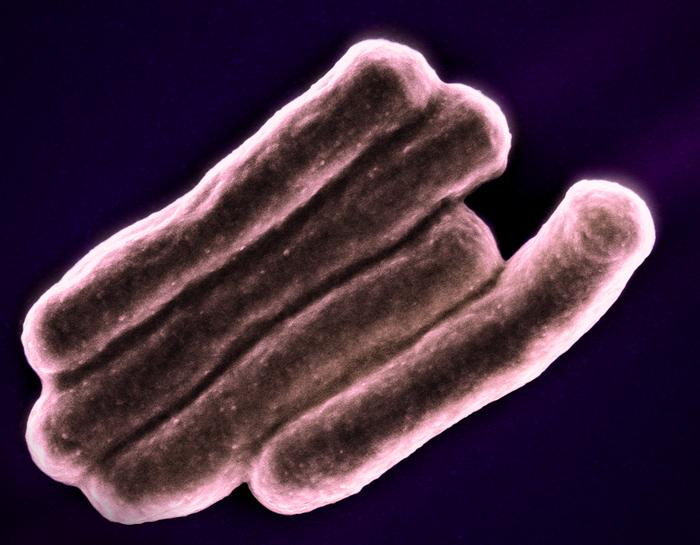The first clinical trial of a three-month tuberculosis (TB) treatment regimen is closing enrollment because of a high rate of unfavorable outcomes with the investigational course of treatment. AIDS Clinical Trials Group 5362, also known as the CLO-FAST trial, sought to evaluate the safety and efficacy of a three-month clofazimine- and high-dose rifapentine-containing regimen. An interim data analysis showed that participants taking the investigational regimen experienced ongoing or recurring TB at rates above thresholds set in the study protocol. Based on these findings, the study’s independent Data Safety and Monitoring Board (DSMB) recommended closing enrollment and modifying the treatment and follow-up of participants who received the investigational regimen to optimize outcomes. The National Institute of Allergy and Infectious Diseases (NIAID), part of the National Institutes of Health, accepted the DSMB recommendations. Participants are being notified of the findings and analyses of the study data are ongoing.

Credit: NIAID
The first clinical trial of a three-month tuberculosis (TB) treatment regimen is closing enrollment because of a high rate of unfavorable outcomes with the investigational course of treatment. AIDS Clinical Trials Group 5362, also known as the CLO-FAST trial, sought to evaluate the safety and efficacy of a three-month clofazimine- and high-dose rifapentine-containing regimen. An interim data analysis showed that participants taking the investigational regimen experienced ongoing or recurring TB at rates above thresholds set in the study protocol. Based on these findings, the study’s independent Data Safety and Monitoring Board (DSMB) recommended closing enrollment and modifying the treatment and follow-up of participants who received the investigational regimen to optimize outcomes. The National Institute of Allergy and Infectious Diseases (NIAID), part of the National Institutes of Health, accepted the DSMB recommendations. Participants are being notified of the findings and analyses of the study data are ongoing.
The daily regimen evaluated in CLO-FAST consisted of eight weeks of clofazimine (a 300 mg two-week loading dose followed by 100 mg for six weeks), high-dose rifapentine (1200 mg), isoniazid, pyrazinamide and ethambutol (PHZEC), followed by five weeks of clofazimine (100 mg) with rifapentine, isoniazid and pyrazinamide (PHZC). Participants were randomly assigned to receive either the investigational regimen or six-month standard-of-care treatment, or to participate in a sub-study focused on the investigational regimen’s pharmacokinetics (i.e., the way the body distributes, absorbs, metabolizes and excretes drugs). The trial began enrollment in November 2021 and had enrolled 104 of 185 planned adult participants at sites in Haiti, India, Malawi, South Africa, and Zimbabwe at the time of the interim analysis.
While the investigational regimen did not meet study efficacy criteria, the DSMB determined there were no safety concerns with the drugs. In alignment with DSMB recommendations, participants randomized to receive the investigational regimen will complete the full three-months of treatment as planned, then take an additional three months of rifampin and isoniazid. Follow up of participants in the investigational arm will be extended from 65 weeks to 117 weeks. Participants who already successfully completed the investigational regimen will be monitored closely to confirm they remain free of TB and will receive full standard treatment as indicated.
The World Health Organization estimates that 10.6 million people fell ill with TB in 2021, and 1.6 million people died—the first increase in those estimates in more than a decade. The Centers for Disease Control and Prevention estimates that approximately 13 million people in the United States live with latent TB infection—during which TB bacteria remain alive, but inactive—and 8,300 TB cases were reported nationwide in 2022. Identifying shorter TB treatment regimens is crucial for limiting the spread of infection, reducing drug resistance, improving quality of life for people with TB disease, and reducing demands on health systems worldwide. The interim results of the CLO-FAST trial do not support advancing this specific regimen for further evaluation, but the study data will provide essential evidence to inform TB science. NIAID continues to prioritize research to advance TB treatment, including evaluating new drug combinations to simplify or shorten treatment duration. NIAID and the A5362 study team express deep gratitude to the study sites and participants who took part in the CLO-FAST trial.
Media inquiries can be directed to the NIAID Office of Communications at 301-402-1663, [email protected].
NIAID conducts and supports research—at NIH, throughout the United States, and worldwide—to study the causes of infectious and immune-mediated diseases, and to develop better means of preventing, diagnosing and treating these illnesses. News releases, fact sheets and other NIAID-related materials are available on the NIAID website.
About the National Institutes of Health (NIH): NIH, the nation’s medical research agency, includes 27 Institutes and Centers and is a component of the U.S. Department of Health and Human Services. NIH is the primary federal agency conducting and supporting basic, clinical, and translational medical research, and is investigating the causes, treatments, and cures for both common and rare diseases. For more information about NIH and its programs, visit https://www.nih.gov/.
NIH…Turning Discovery Into Health®




